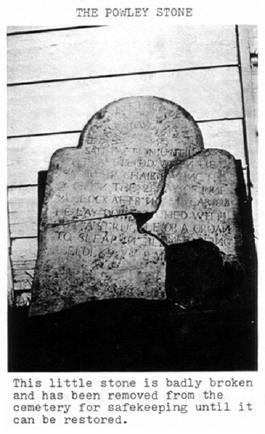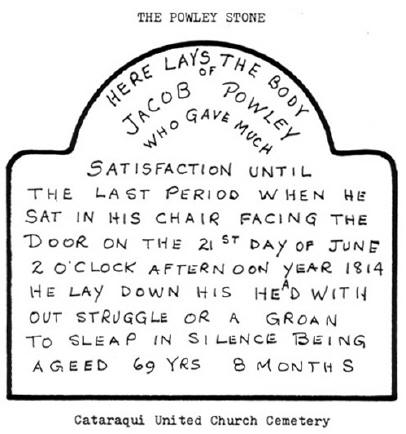proof-genealogy.com
|
|
Johann |
Jacob Powley "Jacob" |
| Birth Date: |
October 14, 1744 |
|
| Birth Location: |
Not known |
|
| Death Date: |
June 21, 1814 |
|
| Death Location: |
Ontario, Canada |
|
|
Burial: |
Cataraqui United Church Cemetery Cataraqui, Ontario, Canada |
|
|
|
||
| Parents | |
|
Father Not known. (?-?) |
Mother Not known. (?-?) |
| Siblings (in birth order) |
| Not known. |
| Marriage | |
|
Johann Jacob Powley married Annetje (or Nancy) Van Voorst. |
|
| Children (in birth order) | |||
| 1 Hannah Powley 1771-1787 |
2 William Powley 1773-? |
3 Elizabeth Powley 1775-1848 |
4 Francis Powley 1776-1861 |
| 5 Jacob Powley 1780-1871 |
6 James Powley 1783-1838 |
7 Mary B. Powley 1793-1864 |
8 Rebecca Powley 1795-1882 |
| Notes | ||
|
According to genealogist Wilman Davis, "an oft repeated story about these two pioneers [Jacob and Nancy] came to me through Charles Wendell David -- born (1885) near Onarga -- a graduate of Northwestern University; Oxford in England; Wisconsin (M.A.), and Harvard (Phd.) -- a top scholar." Jacob and Nancy had settled on
a farm near Schenectady, New York. One day Jacob was busy ploughing
(about 1773 or 1774), when a roving band of Indians came, seized him,
killed his horses, and roasted the horse meat. Jacob was fortunate
to get a piece of the horse's shank. After the Indians feasted, they
took what meat they could carry and headed west across country, taking
Jacob with them. They made long, swift passages. By and by the
shank became unfit to eat and had to be thrown away. Jacob became
very weak. He was a small man, about 110 pounds, jet black hair,
piercing black eyes, very white skin. On coming to a river, which
now flows through Watertown, New York. Jacob played out and and
Indian raised his tomahawk to kill him. One of the Indian squaws
(who had evidently taken to Jacob), knocked the tomahawk out of the way,
picked him up and carried him on her shoulders across the river.
They went a short distance further where they had hidden their canoes,
paddled down the river, crossing the foot of Lake Ontario around the north
side of Wolfe Island to Kingston, Ontario. The Indians went to the
British garrison there where they sold Jacob for three strings of beads
and two hatchets. |
||
|
||
| Sources | ||
|
||


